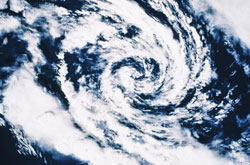You are here: Home › Stressors › Climate Change › Feature Stories › CSCOR Active in Regional Climate Change Impact Research through its Coastal Ecosystem Effects of Climate Change (CEECC) Program
CSCOR Active in Regional Climate Change Impact Research through its Coastal Ecosystem Effects of Climate Change (CEECC) Program

Climate change has a profound impact on coastal and marine environments. Coastal decision makers need scientific information in order to appropriately manage coastal ecosystems impacted by climate change. The goal of CEECC research is to develop a predictive understanding of coastal ecosystem responses to climate in order to inform and facilitate management of the impacts of climate change.
Recent activities include:
Based on the groundbreaking results from her Ecological Effects of Sea Level Rise program, CSCOR program manager Carol Auer was invited to speak about the program and serve on a climate change panel at the Coastal States Organization (CSO) Annual Meeting (Oct. 15-18, 2007 in Woods Hole, MA), the 23rd Annual National Estuarine Research Reserve Meeting (Oct. 22-26, 2007 in Shepherdstown, WV), and the 10th Annual Southern and Caribbean Coastal Management Regional Meeting (Nov 5-8, 2007 in Lafayette, LA). In addition, Carol held a Sea Level Rise workshop in Pensacola, Fl January 22-24, 2008 to create a framework to expand her Sea Level Rise program to the Florida/Alabama Panhandle. For more information contact Carol.Auer@noaa.gov..
CSCOR participated in the National Estuarine Research Reserve System (NERRS) managers meeting October 22-25 in Shepardstown, WV to present different aspects of their climate change research. NERRS managers were introduced to an ecological forecasting tool that will enable them to assess climate change impacts in their estuaries. This tool was developed through the research project Climate Change and Intertidal Risk Analysis, supported through CSCOR’s Ecological Forecasting Program, and was presented by CSCOR-supported researcher David Wethey from the University of South Carolina. For more information contact elizabeth.turner@noaa.gov.
CSCOR scientist Libby Jewett participated in the "Ocean Carbon and Biogeochemistry Scoping Workshop on Ocean Acidification" October 9-11, 2007, at Scripps Oceanographic Institute organized by the Ocean Carbon and Biogeochemistry Program. Assessing impacts of decreasing pH on coastal ecosystems was a special focus. In addition, Dr. Jewett is leading efforts to organize a Town Hall Forum at the upcoming Ocean Sciences Meeting in March of 2008 titled "Ocean Acidification: Towards an Interagency Approach." The goal is to convene representatives from a variety of federal agencies such as NOAA, NSF, NASA, USGS, EPA, and DOE to discuss a vision for a cooperative, interagency, large-scale, Ocean Acidification research program. In addition, Dr. Jewett was chosen to represent NOS on the newly organized Ocean Acidification Planning Committee (and Steering Committee) which was voted into existence on January 15, 2008 at a Seattle planning meeting convened by OAR and NMFS. The OA Planning Committee has representation across line offices including OAR, NESDIS, NMFS and NOS. The committee will take responsibility for sharing information as ongoing, new and potential ocean acidification research develops across NOAA. For more information, contact Libby.Jewett@noaa.gov.
Related Links

